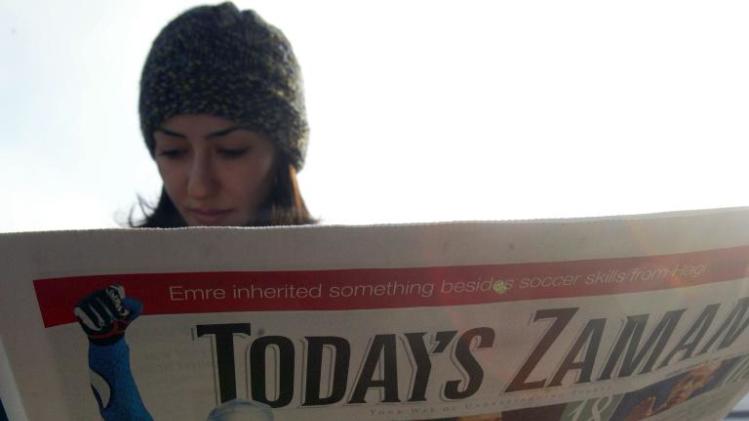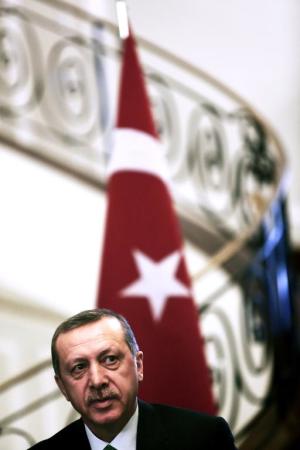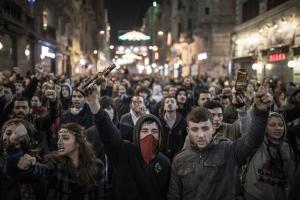Turkey kicks out critical foreign journalist

Istanbul (AFP) - Turkey expelled an Azeri journalist Friday for tweets criticising the government, his newspaper said, stoking concerns about media freedom a day after new Internet curbs provoked a storm of protest.
Mahir Zeynalov's deportation was yet to be officially confirmed, but a photo on Twitter appeared to show police escorting him through an airport on his way back to Azerbaijan.
It followed in the wake of Prime Minister Recep Tayyip Erdogan's government rushing new Internet restrictions through parliament that critics including the EU and Washington worry will limit free expression.
Activists called for a demonstration in central Istanbul on Saturday evening against the new restrictions, which still have to be approved by President Abdullah Gul, an ally of Erdogan.
Zeynalov works for the Zaman daily, a paper close to Fethullah Gulen, an Islamic preacher living in the United States whom Erdogan has blamed for orchestrating a recent corruption probe against members of his inner circle.
The newspaper said that Zeynalov was put on a list of foreign individuals barred from entering Turkey for "posting tweets against high-level state officials".
Zeynalov is already the target of a criminal complaint filed by Erdogan himself for tweets in December about the graft probe, with the prime minister saying he posted "heavy insults and swear words in a bid to provoke the nation to hatred and animosity," Zaman reported.
The Organisation for Security and Cooperation in Europe (OSCE) said Friday that Zeynalov's ejection "is a further setback for the dire state of media freedom in Turkey."
US-based rights group Freedom House said in a report this week that over "the past year dozens of journalists have been fired because of government pressure, and government officials' threats against journalists have become common."
The Committee for the Protection of Journalists (CPJ) says that the aspiring EU member state jails more reporters than any other country including serial offenders Iran, China and Eritrea -- most linked to Kurdish organisations.
"The decision to deport this journalist is harsh and will affect the reputation of Turkey, already notorious for restrictions of press freedom," Nina Ognianova of the CPJ told Zaman on Friday.
The leader of the main opposition Republican People's Party, Kemal Kilicdaroglu, said: "Expelling a journalist for a tweet is unacceptable ... It shows the power of journalists and the weakness of politicians."
'Suffocating environment'
Erdogan has responded to the corruption probe, which has implicated members of his inner circle and their families, by sacking or reassigning of police and prosecutors thought to be close to Gulen.
Critics say that the new Internet curbs, which will enable the blocking of webpages without a court order, is an attempt by Erdogan to silence reporting on the scandal, lurid details of which have been leaked online.
Human Rights Watch said the timing "raises concerns that a defensive government is seeking to increase its power to silence critics and to arbitrarily limit politically damaging material online."
European Parliament chief Martin Schulz called the curbs a "step back in an already suffocating environment for media freedom", while the US State Department said there were concerns that "these proposed measures are not compatible with international standards on freedom of expression".
Erdogan's Islamic-rooted Justice and Development Party (AKP) is "conducting an unprecedented campaign of cleaning up the state apparatus, and journalists can't escape," Erol Onderoglu from Reporters Without Borders told AFP.
Erdogan, in power since 2003 and facing important local elections on March 30, is also seeking to push through legislation that critics say will impinge on the independence of the judiciary.
The political instability, on the back of a heavy-handed response to protests last June in which six people died, is taking its toll on Turkey's economy, with the lira sliding to record lows in recent months.
Capital Economics said in a research note Friday that Turkey "is at serious risk of slipping into a recession"






No comments:
Post a Comment